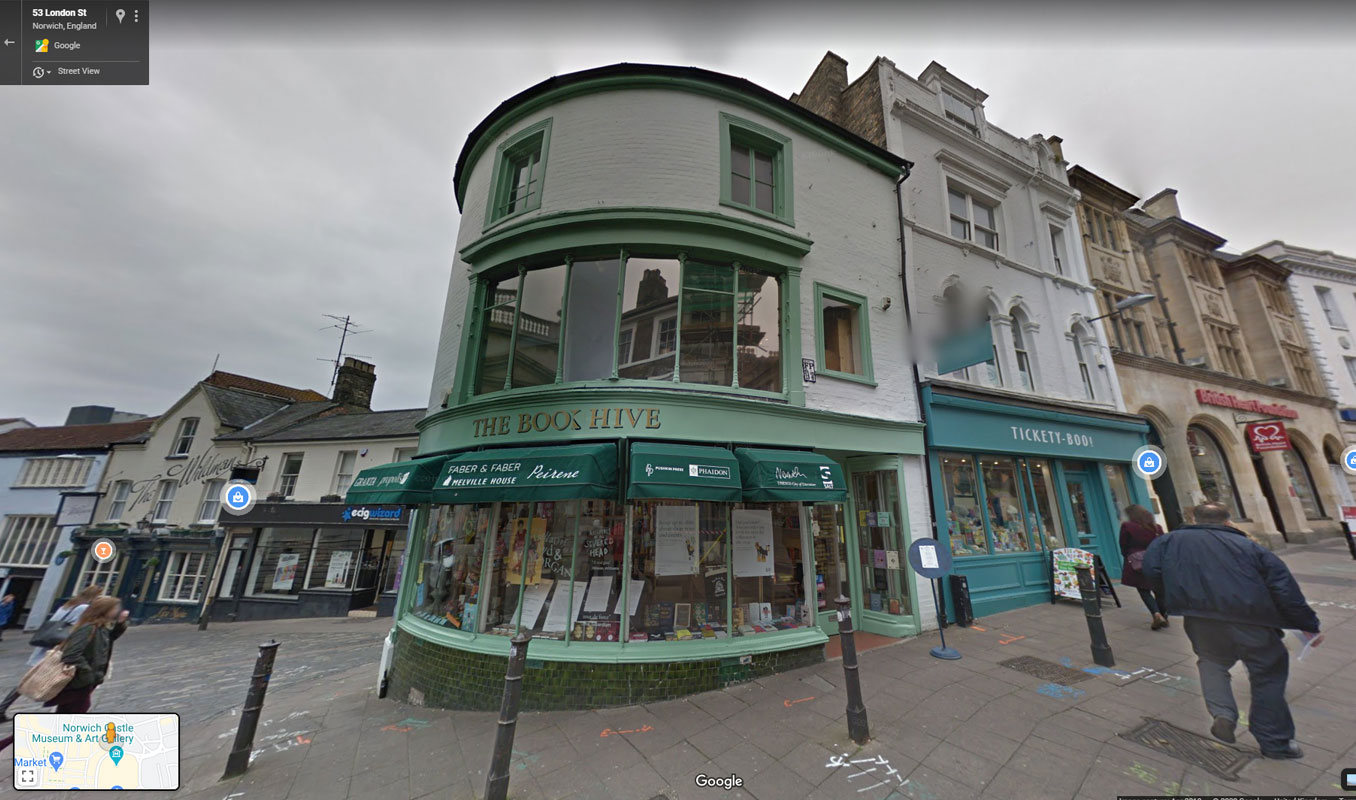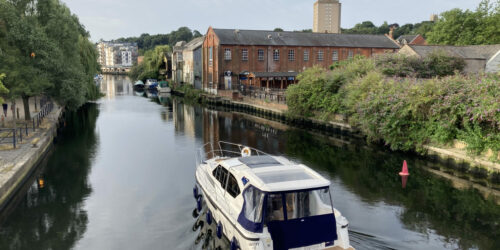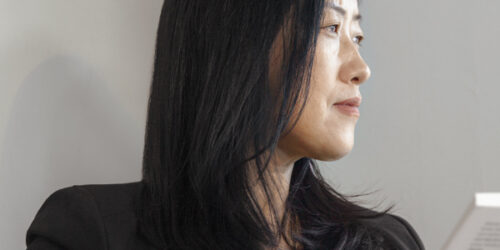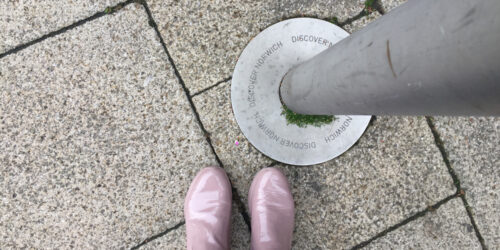
For the Walking Norwich series, virtual writer in residence Thomas Heerma van Voss has written about exploring Norwich via Google Maps, in a piece translated by Danny Guinan.
I’ve been here before, haven’t I? I’m sure I have. I click my mouse a few times in Google Maps and the image grows larger – a classic train station, no doubt about it, with a canopy flanked by tracks on either side, a spacious-looking concourse, several coffee bars. Outside the front entrance is a cobblestone square where cars and buses can park and which pedestrians have to cross on their way into town.
I must have walked here too when I was twelve or thirteen during one of our many holidays in Harwich and my best friend and I were dragged to the station to take the train not to Colchester or Ipswich but, for a change, to Norwich. I can vaguely recall that day, almost twenty years ago now. My best friend’s father, wearing shorts and that perennial smile of his, insisted on taking us to the house once owned by Sebald, someone we had never heard of before; all my friend and I were interested in was finding record shops where we could expand our hip-hop collection. I came back here again later on my own when I was around eighteen or so. I had been living in London for six months in the hope that the grandness of the city would somehow rub off on me, and every now and then I took a train out of town to find some diversion and to see as much of the world as possible. But I can no longer recall most of what I saw back then and my abiding memory is of an overpowering, almost paralysing sense of shame.
I click on my mouse again, this time not to zoom in but to change the image – my mouse is my way of getting around now. I follow the road that leads from the station and cross a bridge that looks very busy on my screen. Pedestrians, cyclists, cars. Is it always this busy here or is it just because of when the photo was taken?
My destination is The Book Hive, a bookshop that looked very inviting when I viewed it recently on my laptop, like almost every other glimpse I get of the outside world does these days. During a Zoom session, two of the staff at the bookshop – on the right Henry, the owner, I believe, and on the left Joe, the bookseller – explained the philosophy of the shop to me and described the kinds of events they organise (or used to organise, I presume) while I sat at my kitchen table writing notes that they would eventually add to bundles of Dutch books translated into English. As I waved to them at the end of the conversation, I said, ‘I hope I will see your store one day,’ even though I knew that was not going to happen anytime soon, that I would be stuck at home for the foreseeable like everyone else, that Norwich would remain beyond my reach.
This walk is as close as I am going to get to visiting The Book Hive for the moment. I’m still sitting at my kitchen table and with each click of my mouse I walk a little further on, not along the pavement to the left and right of me but right down the middle of the road. On my left I see a grey office building, on my right a garage, the contours of a construction site, a takeaway. And in between, on either side, the kind of brickwork I have associated with England ever since I was a child, stately buildings and homes that appear both outdated and triumphant. My best friend’s father once explained ‘the law of the handicap of a head start’ to us using the example of British architecture during one of our endless holidays. Whenever I am in England, I always think of him, of the accuracy of his remarks. I even think about that now as I sit here in Amsterdam staring at my computer screen and dredging my memory.
For the month of October I was the virtual writer in residence in Norwich. The cottage where foreign writers usually stay has lain empty since the outbreak of coronavirus. I knew that would be the case when I applied for the residency and that I would never actually have to leave my own kitchen table. I also thought: I know Norwich a bit and I’ve always enjoyed visiting the city, and two of my stories were recently translated into English so I might be able to help promote them there, but more pertinently: it might prove the catalyst for some unexpected event or other in my life.
And that’s how I met the gentlemen from The Book Hive, not to mention the staff at the university, secondary school students, fellow writers in England, translators who were in Norwich at the same time as me but who were really there. All of our conversations were instigated by my contact in Norwich, Kate, with whom I spoke on a weekly basis via Zoom. I got to see her cat, caught glimpses of her living room, admired her apparently enormous and idyllic garden. ‘How’s the residency going?’ she would invariably ask.
On one occasion that was as far as we got in our conversation because Kate’s house regularly fell victim to squirrels chewing on the internet cables. An image that for some inexplicable reason really touched me. I would gladly have travelled to Norwich for that reason alone, to watch the squirrels munching away on the internet cables in that idyllic house.
‘Fine,’ I would invariably answer, without really knowing how I should assess the residency. I was there in Norwich but at the same time I wasn’t. Was that how it was supposed to work? In any case, I found myself becoming attached to the idea. To the profusion of digital contact, the regularity of it, the fragmented scraps from a world that was somehow familiar to me but entirely alien, too. It was undoubtedly a very detached way of connecting, but maybe I have never connected with anything in any other way.
I click on. The road in Norwich bends a little to the left, lots of shops on either side, more houses, even more cars, and a bus now as well. All of a sudden I think of my ex and how we hoisted this kitchen table up into our apartment in Amsterdam one and a half years ago. We had actually planned to take a long trip around the USA this spring. Not virtually, but in a camper. We would buy one together and I would get my driving license. But last November, almost exactly one year ago, before we had become each other’s ex and were still having breakfast together as always, me sitting where I am sitting now and her on the now empty chair opposite, she rather suddenly announced: ‘I can’t go on like this.’
She left the very same morning.
Billy the cat went with her, along with half of our things.
In the doorway she said: ‘It’s not your fault.’
And: ‘Sometimes you have this look on your face, and after all these years I still don’t know what you’re really thinking. Or feeling. Like you’re just half there.’
It was shortly afterwards that I first heard about coronavirus and then the outside world fell silent too.
Again I click on, moving faster, the road twisting and turning, going against the traffic now, I pass an Indian restaurant, a Tesco.
And then I recognise it. The junction with the forlorn-looking patch of grass in the middle and traffic merging from all directions, on the right two impressive and elegant buildings (museums, apartment complexes?). Yes, I’ve been here before. I try to imagine myself as a twelve-year-old, blindly following my best friend’s father around. And wasn’t I here too when I was eighteen? Even then I always waited for instructions from others, people who would say: you need to go this way or do that. I think of the Dutch kid who must have walked here, the lanky teenager with nothing to look for and nothing to find – lives that feel so far away and yet so unmistakably mine. As if very little has actually changed since then. One moment I’m strolling around Norwich, the next I am staring at a pixelated image of that same junction on my laptop.
In my mind’s eye I see myself roaming around a town I am now only able to access digitally, see myself sitting at the kitchen table, first alone, then with my ex. I knew what she meant. I often don’t even know what I think or feel about things myself. I like to keep my distance, to a certain extent, or maybe I’ve just gotten used to doing that. Maybe that’s why I was so pleased to have some of my work translated into English, because it meant that my stories could be mine and someone else’s at the same time – I recognised my characters, my scenes, my tone of voice, but I would never have been able to write those words myself. Perhaps that’s also why I applied for this online sojourn and am willing to click away endlessly all day on my computer.
During my virtual residency I often found myself wondering what the world would be like if there was a virus going around that actually forced people to stay indoors all of the time. There would be virtual writers’ residencies everywhere. Virtual holidays, virtual football matches. All of a sudden I saw a future for myself as a virtual husband, as the virtual coach of my virtual child’s football team. I would be involved in everything and never present at anything.
Go right, Google Maps tells me. I click my mouse repeatedly, moving faster than I would ever have been able to if I was actually there walking around. In a few clicks I’ve reached the end of yet another street, turned yet another corner.
And then there it is. THE BOOK HIVE. A beautiful, stylish building on the corner of the street. Big windows full of books, the walls and shutters all in attractive shades of green. The lights in the shop are on but I can’t see anyone in the photo. Oh, how I’d love to step inside, inhale the smell of all that paper, study the book covers, strike up a conversation with the staff, allow them to recommend one title after another to me. For now I will have to make do with this photo, this little slice of England on my screen in Amsterdam, my mouse won’t let me get any closer to the shop. All I can do is keep staring at it, at this fragment of life from across the sea – yet another world I have only half visited.
Nevertheless, during our last meeting Kate said to me: ‘I’ve seen you more than I do writers when they’re here in our cottage.’ I thought this was a very telling remark, although I wasn’t sure whether it said more about me, our virtual contact or the writers who usually come to stay in Norwich. Kate and I were busy assessing the virtual residency, saying things like ‘strange’ and ‘successful’, but pretty soon we ran out of words.
‘And I’ve seen you more these weeks than my friends and family, than everyone, in fact,’ I replied, and it was true. I thought of all the people who had popped into my life through Kate, all those faces on my computer screen to whom I had repeated the same line each time: ‘One day we will actually meet,’ I had to say something after all, and I said it to Kate now, too.
Would I ever get to see her? I’d like to, and I’d like to actually walk into The Book Hive someday as well, even though you could ask yourself whether a virtual trip should automatically lead to a physical one, whether there is any logic to that sequence.
‘We will meet,’ Kate said during our final session.
I nodded, but I don’t know whether she noticed. Because at that very moment she hung up and I was left looking at the same screen I am looking at now, and then the picture went black and all I could see were the words: the host has ended the meeting. Today here is no host, no meeting, only me and my reflection. I click and click, look and look again, trying to zoom in even when I know I can’t, and finally close my laptop.
 Our first virtual writer in residence is Thomas Heerma van Voss, one of the writers featured in Verzet, the Strangers Press chapbook series of New Dutch Writing. Thomas Heerma van Voss has published four works of fiction, including the novel Stern in 2013, and the short story collection The Third Person in 2014. His chapbook, Thank You For Being With Us, comprises two short stories feature compelling, well-wrought characters who draw the reader entertainingly into their simultaneously hilarious and heart-breaking lives. The stories are translated by Moshe Gilula.
Our first virtual writer in residence is Thomas Heerma van Voss, one of the writers featured in Verzet, the Strangers Press chapbook series of New Dutch Writing. Thomas Heerma van Voss has published four works of fiction, including the novel Stern in 2013, and the short story collection The Third Person in 2014. His chapbook, Thank You For Being With Us, comprises two short stories feature compelling, well-wrought characters who draw the reader entertainingly into their simultaneously hilarious and heart-breaking lives. The stories are translated by Moshe Gilula.
You may also like...
Read ‘Walking on Water in Norwich’ by Vahur Afanasjev
‘I was walking with history in the making.’

6th July 2020
Read ‘The Path to Doris Lessing’s Archive’ by Kang Young-sook
‘Is it possible for anyone to live as fully as Doris Lessing?’

9th December 2019
Read ‘Stranger on a Walk’ by Ekaterina Petrova
‘My walks became as much about the real as about the imagined, as much about the visible as about the invisible, about the long-lost as about the still-remembered.’

5th December 2019






